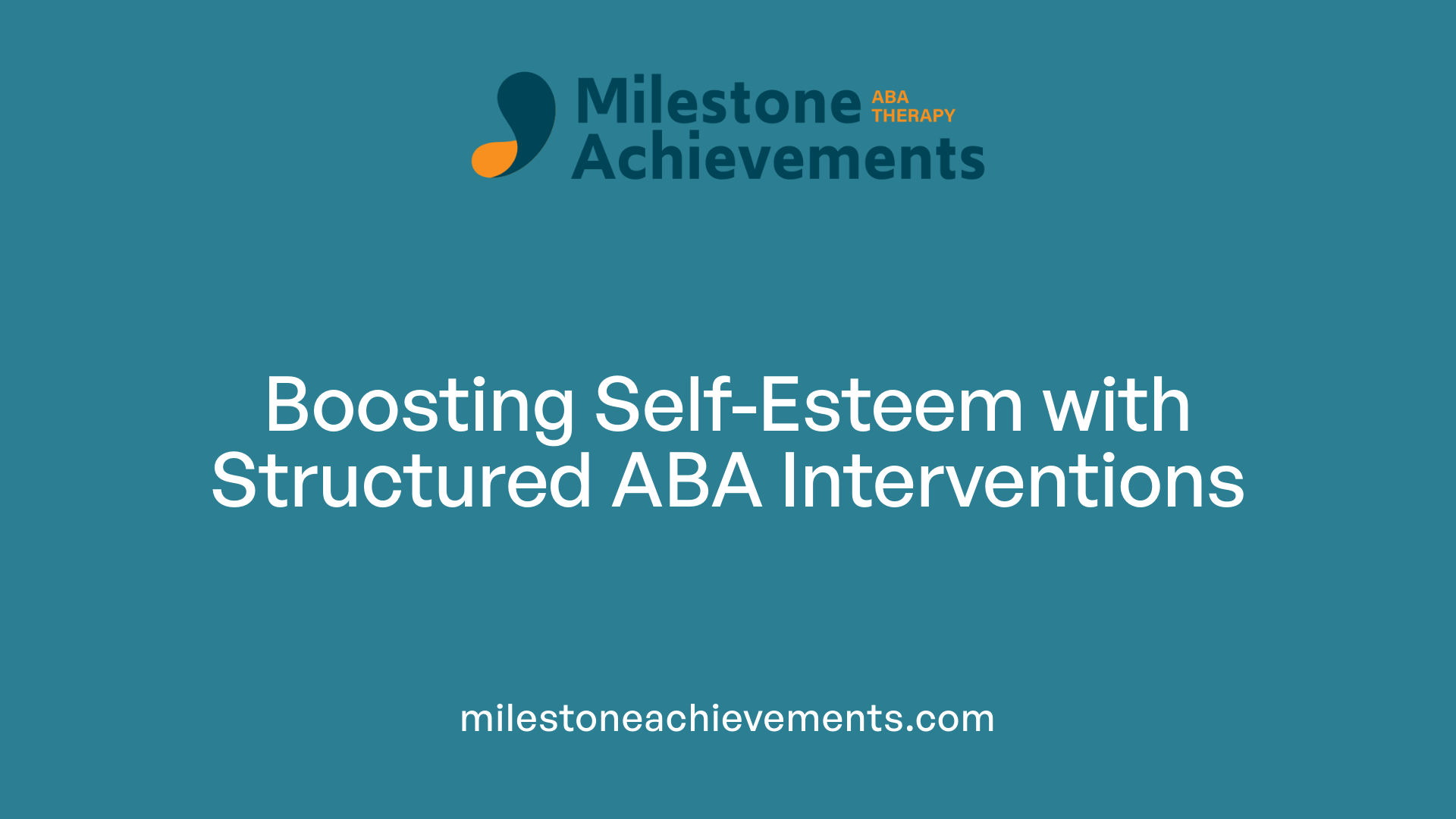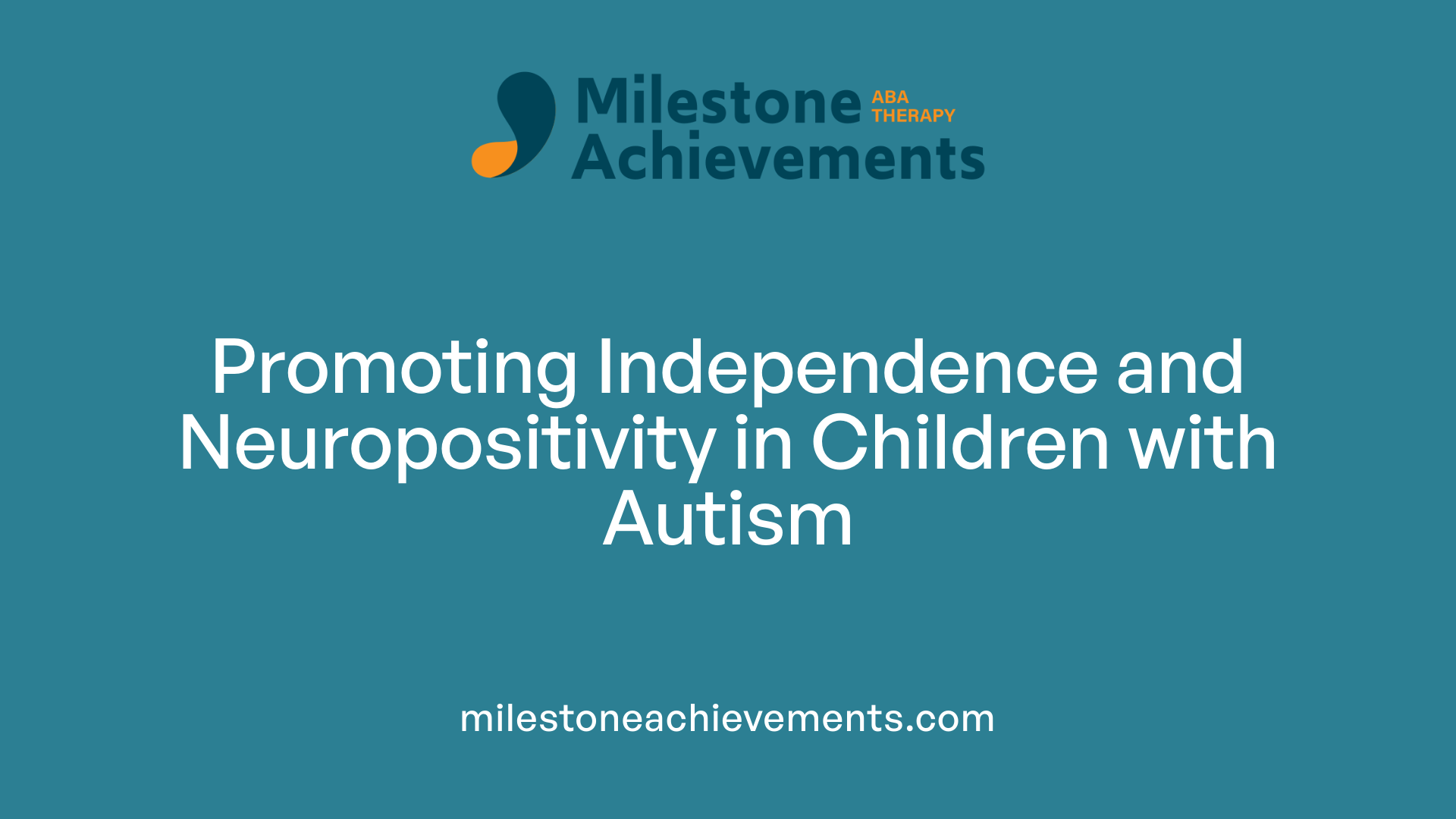
The Role of ABA Therapy in Building Self-Esteem in Children with Autism
Empowering Autistic Children: How ABA Therapy Fosters Self-Esteem
Understanding the Connection Between ABA and Self-Worth
Autism Spectrum Disorder (ASD) presents unique challenges that can impact a child's self-esteem and self-image. Applied Behavior Analysis (ABA) therapy, a well-established, evidence-based approach, plays a vital role in addressing these challenges by teaching essential skills that promote independence, confidence, and overall psychological well-being. This article explores how ABA therapy supports self-esteem in children with autism, the strategies involved, and its alignment with principles of neuropositivity.
The Effectiveness of ABA Therapy in Enhancing Self-Esteem

Is ABA therapy effective for enhancing self-esteem in children with autism?
Research shows that ABA therapy plays a significant role in boosting self-esteem among children with autism. This approach emphasizes teaching new skills through personalized, structured programs that break tasks into manageable steps and use positive reinforcement. Such methods help children develop confidence in daily activities, from self-care to social interactions.
Numerous scientific studies indicate that ABA improves essential skills like communication and adaptive behaviors. These improvements often lead to reductions in problematic behaviors such as self-injury and aggression, which can negatively impact self-esteem. As children learn and succeed in new areas, they often feel more competent and accepted, fostering a positive self-image.
ABA therapy also supports the development of social skills and independence. Children gain confidence as they participate more fully in their environments, build relationships, and effectively advocate for themselves. This progress can significantly enhance their overall well-being and quality of life.
In summary, ABA does more than address behavioral challenges; it actively promotes emotional resilience and a sense of self-worth. Through consistent coaching and reinforcement, children with autism can build the confidence needed to face challenges, enjoy social interactions, and develop a healthier self-esteem.
Building Confidence and Self-Image Through Targeted Skills Training
What is the role of ABA therapy in building self-esteem in children with autism?
Applied Behavior Analysis (ABA) therapy is a powerful approach to helping children with autism develop a positive self-image and confidence. It works by teaching essential skills in communication, social interactions, and daily living, all of which are vital for independence.
ABA uses positive reinforcement to encourage children to succeed and value their abilities. For example, when a child initiates a conversation or completes a self-care task, they receive praise or other rewards. This feedback reinforces their efforts, helping them see their growth and build confidence.
An important aspect of ABA is improving social skills. Children learn to share, take turns, and engage in play, which reduces feelings of anxiety and increases their sense of competence in social settings. As they experience success and positive interactions, their self-esteem improves.
Structured routines and individualized goals create a predictable environment that provides children with a sense of security. When routines are mastered and goals are achieved, children gain a sense of accomplishment and control over their lives.
Research shows that ABA interventions not only promote skill development but also support emotional well-being. By fostering self-control, communication, and social skills, ABA helps children with autism see themselves as capable and valued individuals. This positive self-view encourages resilience, autonomy, and overall happiness.
In summary, ABA therapy helps children with autism build confidence by teaching vital skills, encouraging positive social experiences, and creating a supportive environment that celebrates their progress.
Influence of ABA on Psychological Well-being and Resilience

How does ABA therapy influence psychological well-being and confidence in children with autism?
ABA therapy plays a vital role in fostering emotional well-being and self-confidence among children with autism. By focusing on individual strengths and challenges, ABA programs employ structured, personalized strategies such as positive reinforcement, skill teaching, and behavior modification. These approaches help children acquire essential skills in communication, social interaction, and daily living activities, which are critical for developing independence.
The process of breaking tasks into manageable steps and celebrating small successes enhances children’s sense of mastery. As children experience consistent successes, their self-efficacy and confidence grow, which improves overall psychological health.
Research illustrates that targeted ABA interventions can significantly reduce challenging behaviors and anxiety. For example, by decreasing problematic behaviors, children feel safer and more comfortable engaging with their environment. This reduction in emotional distress supports better mental health and resilience.
In addition, ABA's emphasis on developing emotional regulation skills equips children with tools to manage their feelings more effectively. When children learn how to regulate emotions and reduce anxiety, they demonstrate increased resilience and a greater capacity to handle new or difficult situations.
Overall, ABA’s tailored, evidence-based techniques promote not only skill acquisition but also emotional strength. This development of mastery experiences and self-efficacy helps children with autism face life's challenges with greater confidence and resilience, laying a foundation for improved long-term well-being.
Strategies in ABA Supporting Self-Esteem Development
 ABA therapy incorporates several effective techniques aimed at building self-esteem and resilience in children with autism. Positive reinforcement and praise are fundamental, encouraging children to repeat desirable behaviors and fostering a sense of achievement.
ABA therapy incorporates several effective techniques aimed at building self-esteem and resilience in children with autism. Positive reinforcement and praise are fundamental, encouraging children to repeat desirable behaviors and fostering a sense of achievement.
Setting clear, achievable goals allows children to experience success, while self-monitoring techniques empower them to track their progress, promoting independence and confidence. Social stories and role-playing exercises help children understand social cues and emotions, improving self-awareness and emotional regulation.
Using visual supports such as schedules, checklists, and visual cues assists children in organizing tasks, reducing anxiety, and recognizing their accomplishments. Creating a nurturing environment that emphasizes acceptance and neuropositivity is crucial. Such environments celebrate small victories, involve family and peers, and reinforce the child’s strengths.
Collectively, these strategies help children develop a positive self-image, resilience, and the motivation to face challenges, supporting overall growth and well-being.
Impact on Independence, Life Skills, and Neuropositivity

How does ABA therapy impact independence and life skills related to self-esteem?
ABA therapy significantly boosts independence and self-esteem in children with autism by focusing on teaching essential practical skills. These include self-care routines like grooming, dressing, toileting, and meal preparation, as well as communication, social interaction, and problem-solving abilities.
The therapy is highly structured and customized, ensuring each child's unique strengths and challenges are addressed. Positive reinforcement techniques motivate children to master daily tasks, leading to a sense of achievement and increased confidence.
Research shows improvements across multiple domains—cognition, language, adaptive behavior—that contribute to a greater sense of self-worth. Celebrating small successes and promoting independence encourage children to become more self-reliant. Additionally, parent training and support systems reinforce these skills, providing a stable environment where children can thrive.
Ultimately, ABA therapy’s emphasis on skill development and consistent support helps children with autism build resilience, improve self-esteem, and prepare for meaningful participation in everyday life.
What is the relationship between ABA therapy and neuropositivity in promoting self-esteem?
Modern ABA practices increasingly incorporate principles of neuropositivity, which emphasize acceptance and appreciation of neurodiversity. This approach recognizes each child's individual strengths and promotes an empowering perspective.
Integration of neurodiversity ideals in ABA involves using affirmations, naturalistic learning settings, and emphasizing positive reinforcement. Such strategies help children view themselves positively, reducing feelings of shame or inadequacy.
Research indicates that neuropositive ABA approaches activate brain systems involved in self-related processing and rewards, supporting the formation of a healthy self-image. These practices foster a supportive environment where children feel valued and understood.
By focusing on strengths and fostering self-advocacy, ABA therapy can cultivate confidence and resilience. Promoting neuropositivity aligns with evolving views on autism, emphasizing empowerment, acceptance, and the development of self-esteem.
Role of family, community, and support systems
Family and community involvement are vital in reinforcing ABA therapy outcomes. Supportive environments that celebrate individual progress and talents help sustain gains in independence and self-perception.
Integrating affirmations into daily routines and surrounding children with encouraging, understanding individuals foster a sense of belonging and self-worth. These social supports help children internalize positive beliefs about themselves.
Community-based initiatives and advocacy promote neurodiversity and inclusion, further reinforcing the child's self-esteem and confidence. When families, clinicians, and community members work together, they create a resilient support network that champions acceptance and personal growth.
In conclusion, integrating ABA therapy with neurodiversity principles and strong support systems plays a significant role in developing positive self-image, independence, and well-being for children with autism.
Fostering Hope and Growth through ABA
As the body of evidence grows, it is clear that ABA therapy offers a comprehensive and effective approach to nurturing self-esteem in children with autism. By teaching essential skills, promoting positive social interactions, and embracing neurodiversity, ABA fosters a supportive environment where children can thrive emotionally and socially. Its focus on individualized goals and strengths aligns with contemporary principles of neuropositivity, ultimately helping children with autism develop resilience, confidence, and a sense of empowerment. When integrated with family and community efforts, ABA becomes a powerful tool in enabling children to reach their full potential and lead fulfilling, self-assured lives.
References
- Independence in Individuals with Autism: Role of ABA Therapy
- ABA and Neuropositivity: Self Esteem Building in Autism Therapy
- Addressing Self-Esteem and Confidence in Children with Autism
- Fostering Positive Self-Image in Children with Autism - Childwise ABA
- Applied Behavior Analysis in Children and Youth with Autism ...
- Building Confidence in Kids with ABA Therapy - ABA Therapist Jobs
- ABA and Neuropositivity: Self Esteem Building in Autism Therapy
- Applied Behavior Analysis in Children and Youth with Autism ...
- 5 Ways ABA Therapy Supports Children With Autism - PediaPlex
- Developing Effective Self-Management Skills in ABA Programs


Partner with us on your child's journey
Milestone Achievements offers evidence-based ABA therapy to help children with autism reach their full potential. Together we’ll set meaningful goals and celebrate progress every step of the way.
Start ABA Services Today


